Guns of January - Multiplayer AAR
- Thread starter unmerged(247551)
- Start date
-
We have updated our Community Code of Conduct. Please read through the new rules for the forum that are an integral part of Paradox Interactive’s User Agreement.
You are using an out of date browser. It may not display this or other websites correctly.
You should upgrade or use an alternative browser.
You should upgrade or use an alternative browser.
Astounding economic growth for France. Thanks for a really good economic update.
Thanks
France really did well. But Austria also did quite a lot.
This session will have two updates since it was really quite interesting. First and foremost Brazil is now at war with Colombia which of course calls for a bit of propaganda
Brazil – Fear Not!
A message from the Brazilian ministry of Defence to the people of Brazil:
A message from the Brazilian ministry of Defence to the people of Brazil:
On the seventh of December 1822, roughly 26 years ago, Brazil formally declared its independence from Portugal. This is a date one should keep in mind. For it did not only mean the end of foreign rule over Brazil, no, quite on the contrary, it meant far more. It meant freedom for the people of Brazil.
Now some may not remember those distant days. Some in our country seem to not know at all what freedom actually is. Well, let me tell you. Freedom is a right. Freedom is the right to not be murdered for political beliefs. Freedom is the right to voice one’s religious opinions. Freedom is the right to dissent. Freedom is the right to be different. Freedom is the right to not suffer injustice. Freedom is the right to be rewarded for one’s work. Freedom is the universal right of man. Freedom is the value of our nation.
However, there are those who oppose freedom. Yes indeed, there are! Men who desire power, men who lust for blood, men who slaughter for joy, they still exist. And they are ready to kill to make their evil fantasies come true. Actually, they are not just able to do it; they have to do it for they know very well that they cannot survive on their own. They cannot make food, they cannot comprehend science and they cannot even properly fight. The only thing they are good at is stealing and oppressing. That is what they do for a living. And if you voice only the slightest disapproval they will come for you and they will find you and… lord… you have no idea what atrocities they are capable of. Now you might think: how could a man as evil as that exist? Well, do not be deceived! They are here, everywhere. Brazil is surrounded by them.
Take Bolivia for example. It is the country named after one of South America’s biggest heroes: Simon Bolivar. But what happened to this nation? Is it a democracy? Does it have a constitution? Is there freedom? See for yourself:

Bolivia has sold out on the revolution. The very same treacherous reactionaries which Bolivar fought all his life are now the ones which control his country. Yet this Junta is not only reactionary, no, they are far worse. They are also incompetent and corrupt. Instead of trying to ameliorate the living conditions of their people they spent every pound they could put their dirty hands on to either pay for their decadent luxuries or to fund their pointless wars with Chile. When this junta then also tried to viciously murder the peasants who rose up to protest against the general famine, our great King knew that “enough is enough” and the Brazilian army was sent in to save the Bolivian people.
However, Brazil underestimated the Junta’s will to survive. Not only did Bolivia escape annexation twice but they also rallied their sinister friends: the reactionaries of Colombia. Fearing that their own stranglehold on power was threatened too – even though there was no provocation from Brazil (we didn’t even troops on their border) – the warmongering Junta of Colombia hideously attacked Brazil in what shall be remembered as the day of infamy. Their murderous hordes stormed into Brazilian territory and they slaughtered everything that dared get into their way.
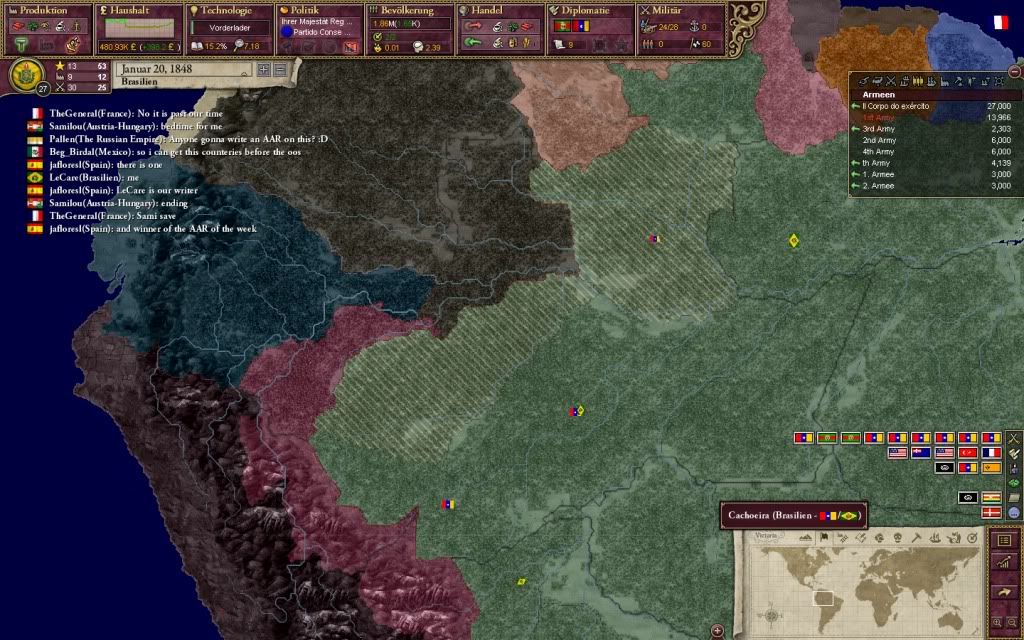
The day of infamy
Now when I walk the streets of Rio de Janeiro I see fear everywhere. Instead of rallying to defend freedom, many have given up hope already. It is true; the north of our country is under occupation. It is true that many villages have been burned. And it is true that we have lost a battle. But fear not for justice is on our side. Already at this moment our brave German ally is striking the Junta at the heart while our armies are using the precious gained time to reorganize our defensive lines. Yes, we have been taken by surprise. And yes, we have been dealt quite a blow. But fear not Brazil, for we are still strong. And we shall strike back with furious vengeance and smash the Junta’s once and for all!
For Brazil! For the King! For Liberty!
- Antonio Braganza, Commander in Chief by appointment of King and Parliament
Last edited:
OOH... Time for some Colombian thrashing. 
Lest I forget:
I hereby knight you as Sir LeCare, OLIR, Knight of the Order of the Large and Intimidating Robert.
Lest I forget:
I hereby knight you as Sir LeCare, OLIR, Knight of the Order of the Large and Intimidating Robert.
OOH... Time for some Colombian thrashing.
Lest I forget:
I hereby knight you as Sir LeCare, OLIR, Knight of the Order of the Large and Intimidating Robert.
Thanks for the honour,
btw, im just now writing an update on Mexico and US. You might not like it though...
Special Issue on the Mexican-American Border conflict
Note: This issue deals with a conflict whose exact causes, practices and effects have not yet been fully examined. A more detailed report on the matter will follow once the consequences of this event can be researched more objectively.
For the United States, expansion always had been a difficult concept. After all, the United States was created in a revolution which was specifically targeted against Imperialism. In that respect it is no surprise the mere idea of using military means to increase the size of the States still repulses many within the US public and government. However, the US has found a way to circumvent this apparent paradox. It is called “Manifest Destiny”.
In essence it claims that the Union has no desire to expand but it rather is burdened by the duty to spread democracy and liberty all over the American continent. If this is an expression of genuine goodwill or just another “civilized” excuse for colonialism cannot yet be decided. It is clear, however, that this concept of Manifest destiny by now forms the basis of American Foreign policy. And this in turn means that America will, sooner or later, have to come to terms with its southern neighbour… or prepare for war.
In the year 1844 it seemed like the latter had come true. Mexico expanded southward, slowly taking the remnants of the USCA, while not compromising on its northern borders. At one point the US simply had enough and sent its navy to blockade the Mexican ports. However, the US had misjudged European support for Mexico. Only days after its navy left port the first diplomatic threats from the UK already began arriving. Initially the US did not want to back down – clearly echoing the policy of manifest destiny – and decided to uphold the blockade. In response the Spanish Navy intervened and decisively outmanoeuvred the Union fleet in Galveston Bay, ultimately forcing the American ships to return to their harbour.
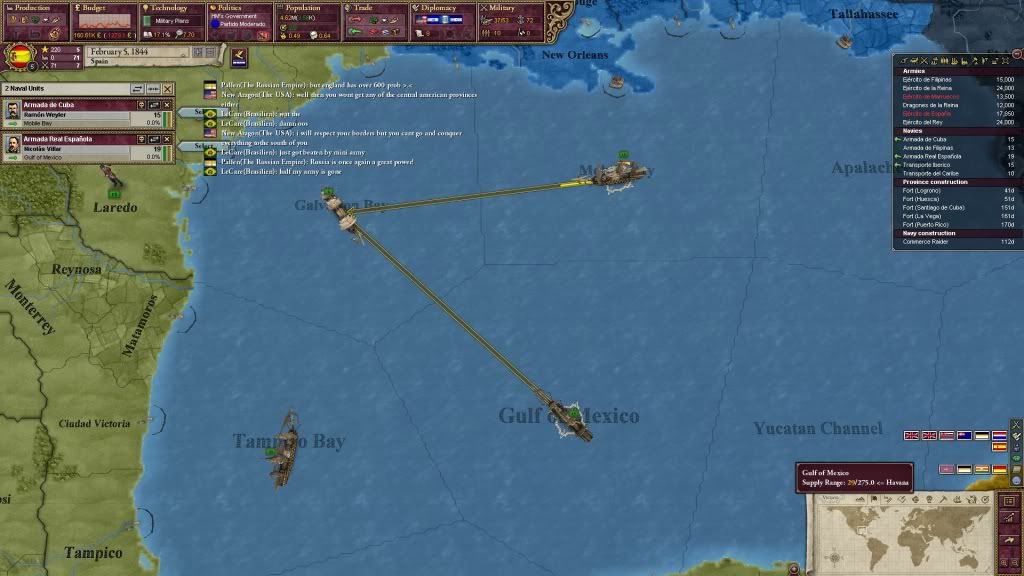
The run-up to the Battle of Galveston Bay (picture is courtesy of the Spanish ministry of defence)
The US then considered a plan for a full-blown invasion but soon dropped the idea when further British warnings arrived (it has to be noted in Mexico’s favour that they never actually called up the United Kingdom to join the conflict as they didn’t want to further escalate the situation). After some more uneventful months an agreement for ceasefire was finally made, ending the hostilities. Yet the issue seems far from solved, especially in the view of the United States public, and it currently is very hard to predict what will happen next.
Last edited:
Austria-Hungary: Rebirth of a dynasty?
For practically the last 500 years central Europe has been more or less shaped only by the will of one family: the Habsburgs. Now, it is true that there are many noble houses in the old world. But the Habsburgs simply stand out. They did not earn their power on the battlefield. They equally did not earn their power by serving others. No, the Habsburgs earned their power through their immense creativity. Where other monarchs required Armies, Austria expanded through marriages. Where other nations built fortifications, Austria made treaties to defend its borders.
Now we live in a time where many of the pillars of Habsburg might are crumbling. Catholicism is continuously being questioned, loyalty is being replaced with nationalism, democracy is being championed and the Holy Roman Empire has ceased to exist. In the context of these events one might easily deduce that the fall of the Habsburgs is becoming increasingly inevitable. However, one should maybe take a closer look, for Austrian ingenuity still ensures that the Kaiser has one or two aces up his sleeve. And he surely plays his cards well.
This once again became clear in the difficult 1840’s. When Prussia united northern Germany it seemed like all odds were against Austria. The German nationalists in the northern area of the Empire seemed to become ever more willing to join a state led from Berlin while the other nationalities, especially the Hungarians, were slowly discovering their own identity. The empire was drawing close to being ripped apart. Yet all of a sudden the Kaiser came up with a solution which is both so simple and so effective that only a Habsburg can think of it: the Ausgleich.
The idea behind it is simple. Instead of the Kaiser being the Kaiser of Austria, he is now the Kaiser of Austria-Hungary. The Hungarians therefore from now one have the same rights and privileges as the Germans, with Hungarian even becoming an official language. One can at this point of course draw into question if this really is a big advancement for the Hungarian people. The Kaiser stays the Kaiser after all. But that is pretty much regardless because the Hungarians like it. And that is the only thing that counts due to two reasons. Firstly it solves the issue of Hungarian nationalism meaning that the Kaiser has one less rebel group to fear. Secondly and more importantly it ties the Hungarians to the Empire as they now also have a motivation to defend their country from rebels or invaders. So in one blow the Habsburg state has not only become more stable but also more powerful.
But not everyone is content. Actually there is one group which probably never will be content: the Serbs. Serbia had always been an unfortunate country. It was the Christian country on the border of the Ottoman Empire. It was the orthodox stronghold on the border of catholic Eastern Europe. And it was the Slavic nation in the backyard of the Habsburgs. Taking all of these factors into account the annexation of Serbia was only a question of time. However, this short history also taught the Serbians how to fight. And while the Hungarians were happy to live in the new union, the Serbians decided to take the battle for their motherland onto the streets.
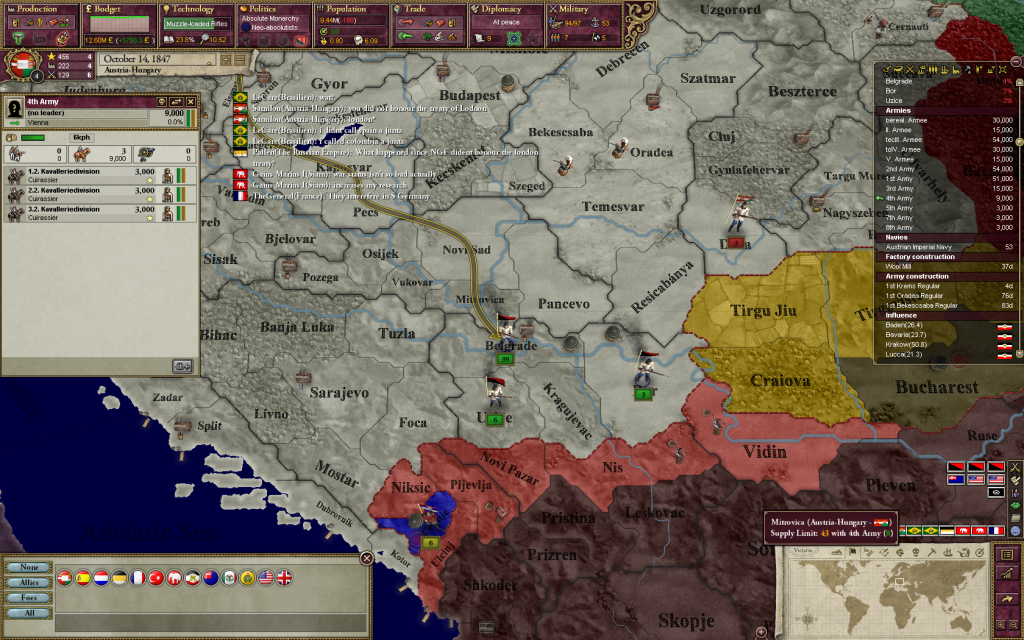
The Serbian uprising. Picture reproduced with permission of the K.u.K. ministry of defence
Yet it was in vain. While the Serbs were numerous and certainly well prepared, they simply had no chance to resist the might of the K.u.K. Army. Why they attempted it in the first place is unknown. Probably they thought the Ausgleich destabilized the country and therefore deduced that the Kaiser would not have the resources to deal with Serbia. Or they were expecting some kind of foreign intervention on their behalf. Whatever the exact reason was, the uprising was crushed. If the Kaiser can continue playing his cards like this then it might very well be that we will soon see the revival of the Habsburg Dynasty as unchallenged leaders of Europe… provided of course that the Kaiser is able to be as creative on the world stage as he is on the Viennese one.
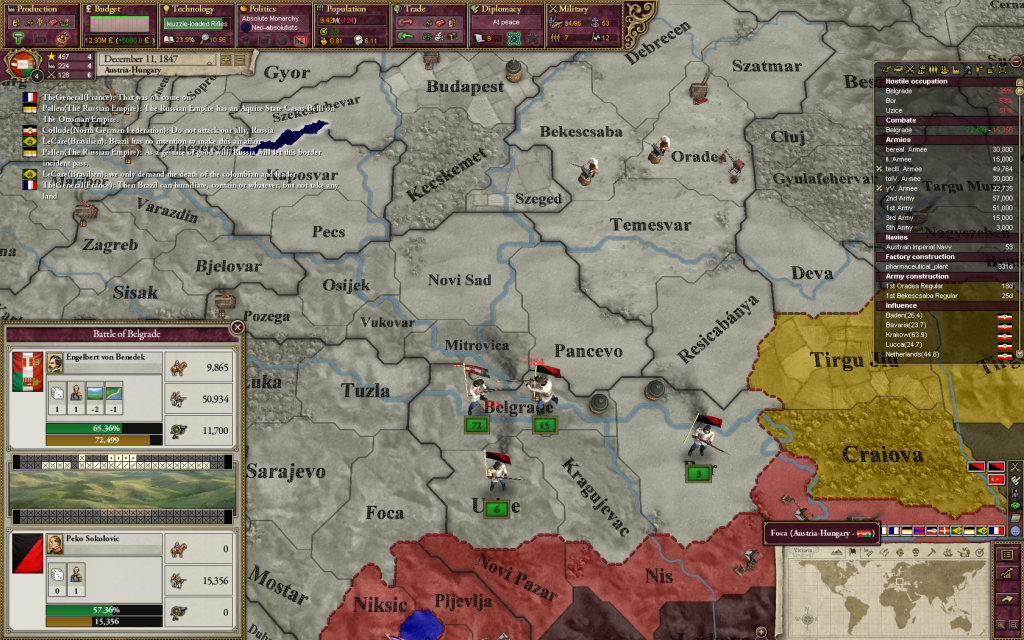
Austro-Hungarian troops quelling the revolt. Picture reproduced with permission of the K.u.K. ministry of defence
Last edited:
Most interesting read. It almost makes one want to give MP a try sometime. What's happening with Japan? They've been rather silent (atleast in the updates) even when war raged in their backyard...
I've always liked following MP games. Austria is particularly interesting when human controlled, as is Russia
Most interesting read. It almost makes one want to give MP a try sometime. What's happening with Japan? They've been rather silent (atleast in the updates) even when war raged in their backyard...
Thanks.
MP really is interesting because it is not just battling others but also trying to build alliances, get concessions, outproduce them etc... It is certainly worth trying out.
I have to add however that currently it is also quite frustating due to frequent crashes and OOS, meaning that one can always at the most only play some years in a row.
Japan had no player for the last two sessions. However now it does have one again and it will be interesting to see what actions they take.
I've always liked following MP games. Austria is particularly interesting when human controlled, as is Russia
Yea, especially with the German and Italian question now coming up, Austria is in an interesting but also challenging position. They are doing quite well however.
The Desert War and the Egyptian Revolution
In 1847 the Ottoman Empire was in a dire state. The sultanate, which not so long ago had threatened to gobble up all of Austria with its sheer unstoppable armies, hovered at the brink of collapse. In a desperate attempt to hold onto his power the Sultan decided for a war against Egypt. It was a disaster.
Why it turned out so badly has as of yet not fully been examined. One reason clearly was imperial hubris. The Sultan had failed to keep up with the times and his armies were equipped with outdated weaponry. More importantly, however, the Sultan also failed to notice the low morale within the Janissarie’s ranks. When the Egyptian troops closed in on Anatolia, many of the Ottoman Empire’s finest armies simply refused to fight.
However, the Sultan was no fool. He quickly realized what terrible mistake he had made and in response to this he decided to dare what no ruler in the Topkapi palace before him would ever have had the courage to do: he enacted a democratic reform. It was not much but the results speak for themselves. Motivated again and with new leadership (the fate of the old Generals is unknown although there is rumours that they were all executed) the Ottoman troops swiftly reorganized and expelled the Egyptians from their land. They then proceeded to advance far into Egyptian territory up until El Alamein where the startled Egyptian government finally surrendered.
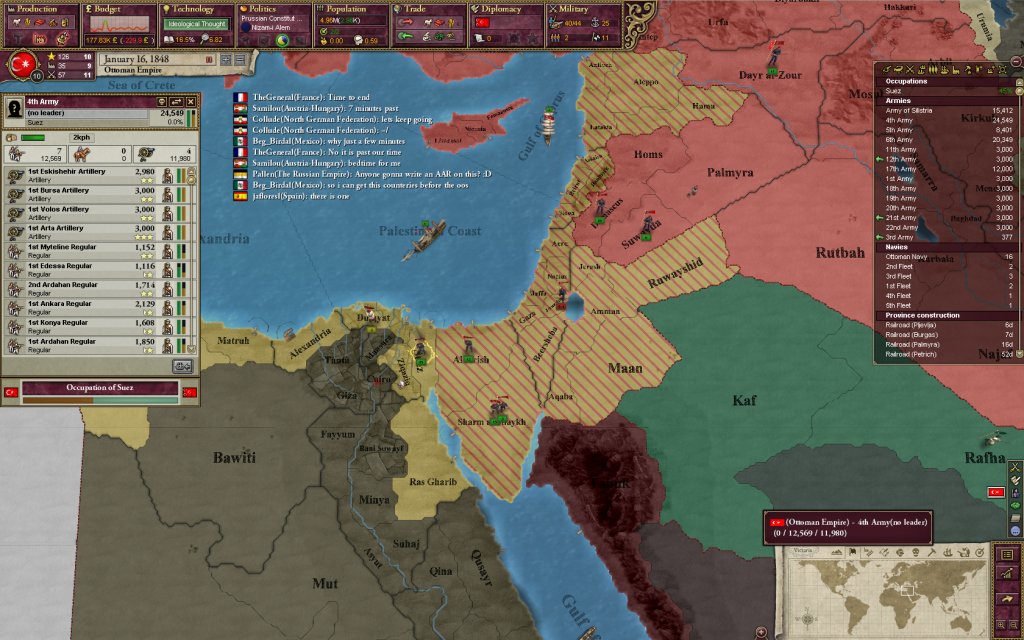
The march to El-Alamein which secured Ottoman victory. Picture provided by the Ottoman ministry of defence
The results of this war are highly interesting. On one hand the effects on the Ottoman Empire are obvious. What had been an absolute Monarchy for hundreds of years now had suddenly become democratic. Yes, when compared to a state like the US, the Ottoman Empire is still a Tyranny. Yet the first, and arguably the highest, obstacle has been overcome. It remains unclear though if the Sultan will not at one point try to reverse the flow of time and reinstate the authority he lost in the Desert War.
The results of this war for Egypt are also noteworthy. Seemingly the contrast between the early successes and the sudden comprehensive defeat completely shattered the trust for the government. And now the peasants are angry. In fact they are very angry. And their demands are clear: they want change.
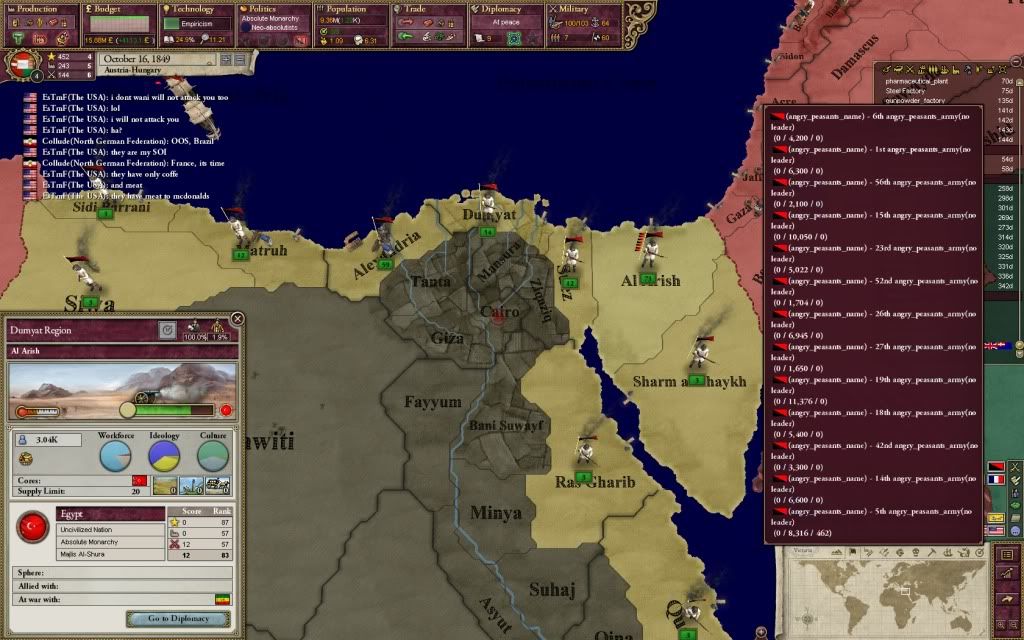
Those Peasants truly are angry. Picture provided by the Austro-Hungarian Secret Service
However they do not only want change in Egypt. They want to spread to all of the Middle East. What especially enraged them was the Italian presence in Aden. When the message spread that the Italians were there to “snatch” their land an impressive amount of 27,000 peasants took to the Streets. The Sardinian garrison which consisted of little more than 1000 men was taken by surprise and quickly overwhelmed. Later, however, reinforcements arrived and the revolt could be quelled. Yet will brute force be enough to contain the masses?
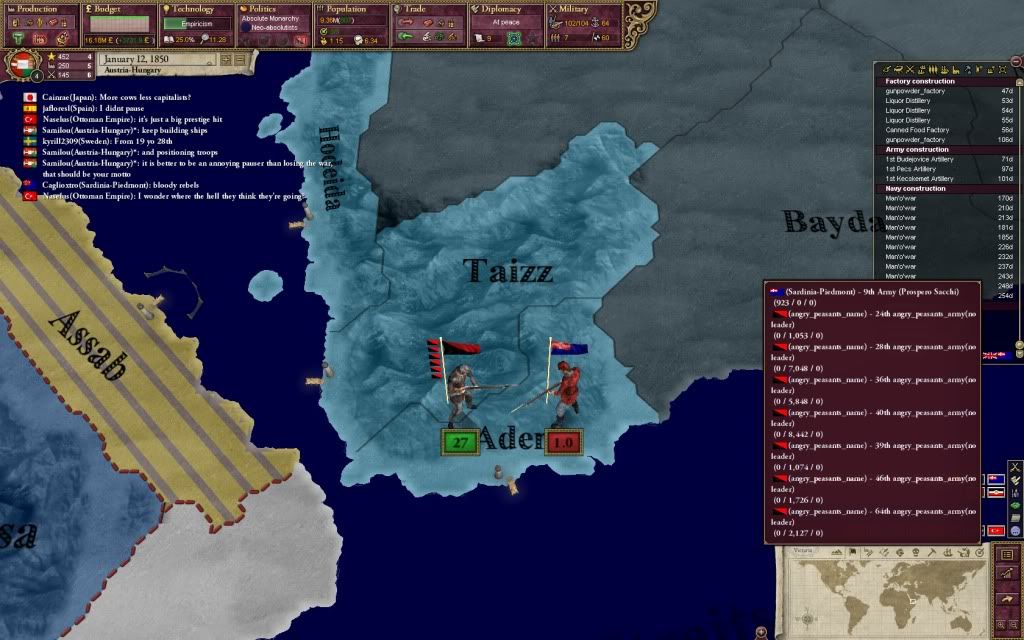
The masses challenge Europe. Picture provided by the Austro-Hungarian Secret Service
Stay tuned.
Next update is on the French-German war of 1850 which had very interesting results.
Next update is on the French-German war of 1850 which had very interesting results.
Good update.
Very interesting to see the Middle-East's authoritarian regimes crumble.
Very interesting to see the Middle-East's authoritarian regimes crumble.
Good update.
Very interesting to see the Middle-East's authoritarian regimes crumble.
I agree. Good use of topicality.
I also enjoyed the Brazilian 'propaganda'.
Good update.
Very interesting to see the Middle-East's authoritarian regimes crumble.
Thanks. Its interesting to see how it recreates some world events
nice AAR.
wish i was in GMT not GMT+8 because this looks sick
Well there is a game in planning which will play at saturdays evening at GMT -5 once patch 1.3 comes out. If I calculated correctly that would be about mid-sunday for you. So if that would work for you, pay a visit to the board: http://z7.invisionfree.com/Blut_und_Eisen/index.php?showforum=27
I agree. Good use of topicality.
I also enjoyed the Brazilian 'propaganda'.
Thanks, there might soon be more...
The Franco-German War I:
The Course of the War
“Sylvester 1850 was like any other New Year. There was the celebration, there was the alcohol of course and there were the fireworks. The fireworks were absolutely magnificent. All of Rio seemed to glow. Little did I know back then what sinister fireworks awaited me in Verdun…”
- Jose Arturio, war correspondent of the World History magazine
The Franco-German war was definitely the defining event of the 1850’s. The London Treaty quite frankly had failed to establish a lasting peace in Europe. The entire continent was split into two camps: the German camp which demanded German unification and the French camp which wanted to prevent this at all costs. In the late 1840’s it seemed like mankind was on the best way to a world war. In virtually the last moment the Ottoman Sultan, who arguably had most to lose from a total war, defused the situation by proposing to reduce all alliances within Europe to defensive pacts. Yet this did not solve the problem. The NGF still demanded Alsace-Lorraine while France continued to resist German unification. Fearing another rise in tensions an emergency meeting of the leaders of Europe was held. Noticing that no one except the main participants had anything to gain from a conflict, they decided that France and the NGF should simply “fight it out”.
“You have to imagine this situation. All of these rich blokes meet in some comfortable Chateux and there decide “to fight it out”. But it’s not them that fight, ey? It is not them who lie dead in Saarbrücken now, is it? You have to imagine this. They decide to go to war and who has to pay for it? We, the people, we have to pay for it. We have to know who our true enemies are. My enemy is the government, all governments; you will pay for what you have done…”
- Franz Meier, German Anarchist
The war officially started with the North German declaration of war in early 1850. However, in all but name, it had begun months earlier with a huge arms race. Both sides were preparing for conflict and both sides mobilized huge amounts of Forces in order to be ready for what was seen as struggle for existence by both nations. In order to gain public support for the conflict which inevitably would result in a huge loss of life, both sides stepped up huge Propaganda campaigns. While the French declared that citizen’s have to “defend the revolution” the Kaiser infuriated the Pan-German nationalists with stories about alleged French atrocities in Alsace-Lorraine. In essence, however, it can be concluded that France in had prepared better for the war. Not only did they have far more troops but they also fortified their borders with state of the art defensive structures.
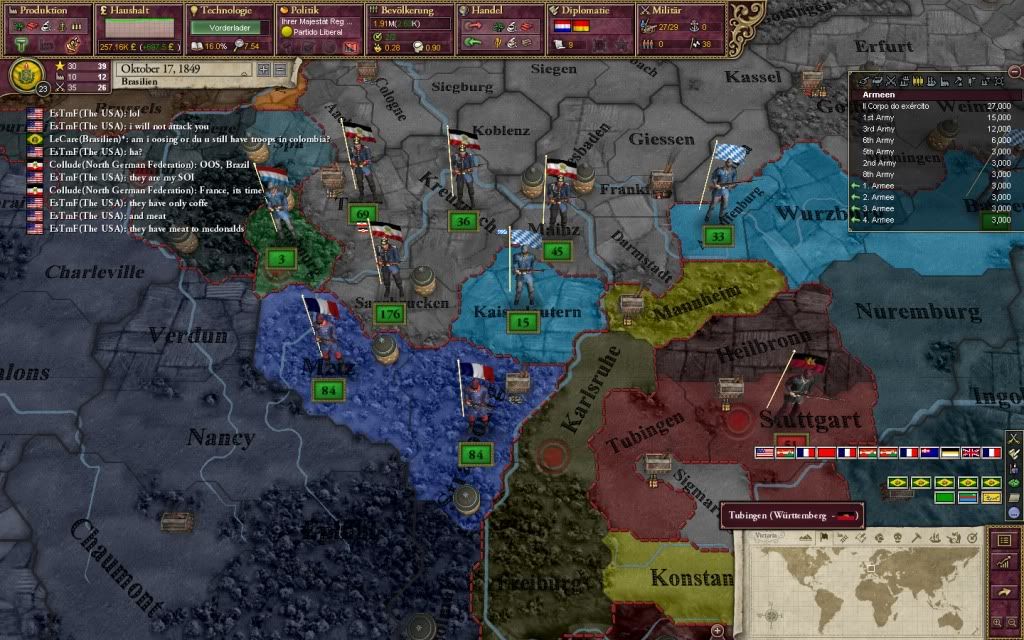
The buildup to the war
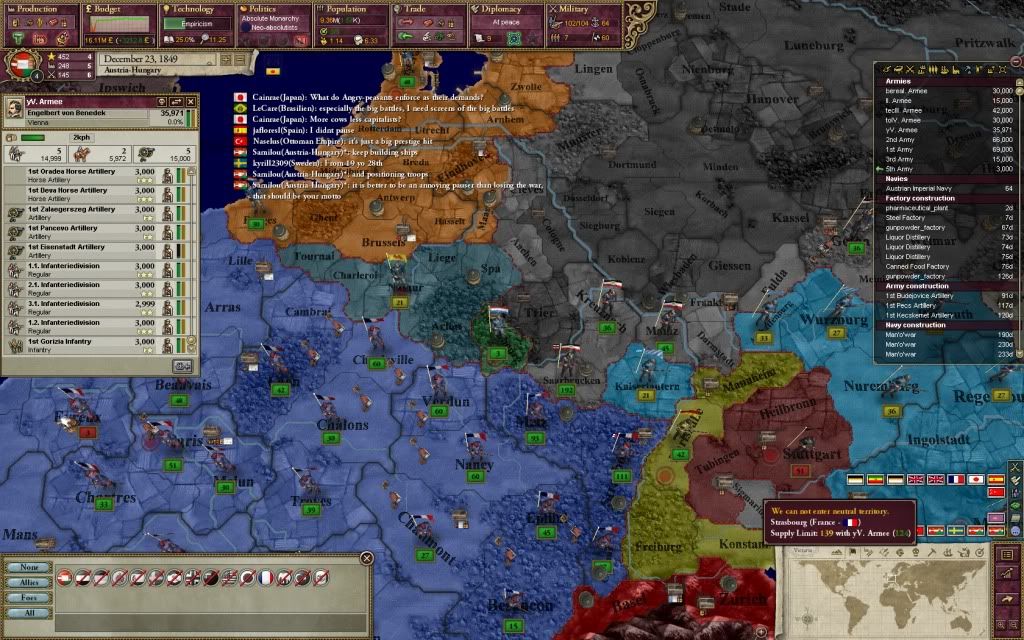
The French preparations. Picture provided by the Austro-Hungarian secret service
The Germans did not predict this. They were convinced that their military was way superior to what they termed the “French militia” and chose a massive offensive as opening move. This proved to be a fatal mistake. The French had expected this and therefore could use their fortifications to their maximum advantage. Further the French were numerically superior to the advancing North German army. The result was obvious: wave after wave of German soldiers was slaughtered. Yet the General’s failed to realize this. They were convinced that the next advance would be the “push to victory”. Yet the French lines remained unbroken.
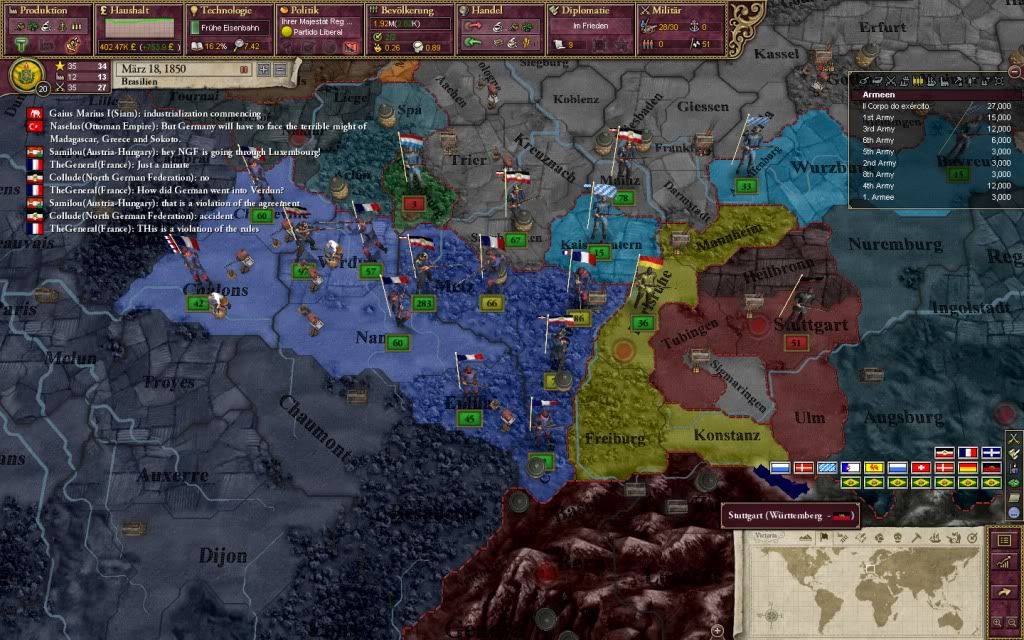
The German offensive as experienced by our war correspondent
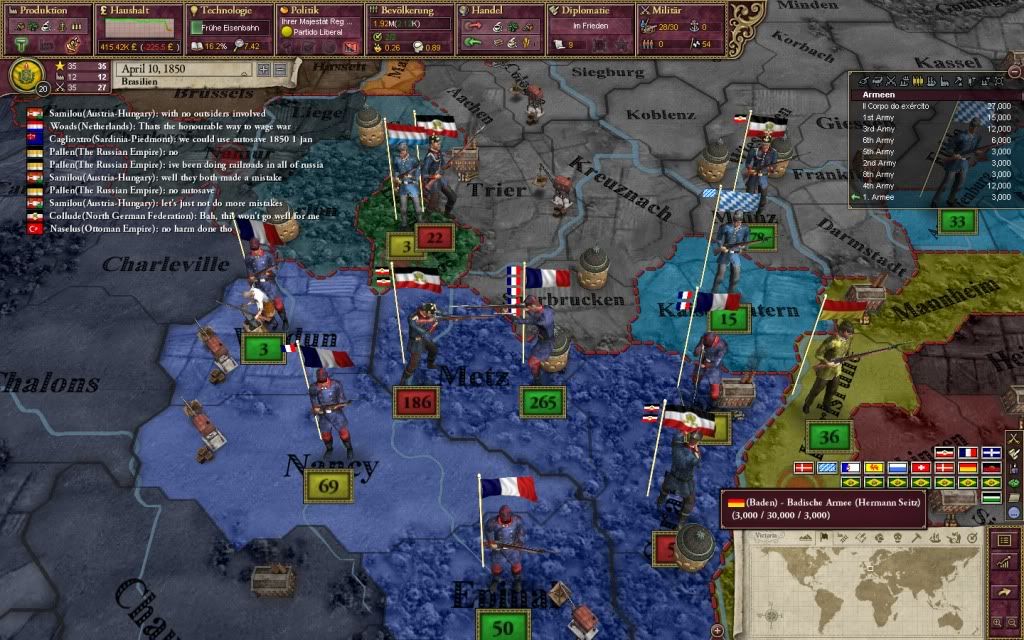
The madness which ensued
“It was a hideous, a terrible sight. On one hand you just had to be impressed by these men. Group after Group, Column behind Column, Brigade by Brigade, they simply ran head on against the French walls. Such bravery indeed… On the other hand you also had to be horrified by what these men were ordered to do. After the third advance failed it was clear that there would be no victory. But the command for the next assault came just as the wounded returned. And they followed it. No questions asked; they just stormed into certain death. I wonder what compels men to do this. I could barely look up, so frightening and so terrifying was the artillery that turned every field into a wasteland. But they charged right in. 200,000 dead in just a few weeks. Such a waste of life for a now worthless land. For some nation this might be a victory. But the good in man has been decisively defeated. I only hope that such horror will never cross the Atlantic Ocean. Sometimes to be a coward is to be a hero…”
- Jose Arturio, war correspondent of the World History magazine
After several attempts to dislodge the French from their defensive positions the German army was exhausted. Their will to fight had been broken and their losses were irreplaceable. The French Generals saw their opportunity and ordered a swift advance into Saarbrücken. This proved to be the decisive blow for Germany. With their main army now encircled, any hopes of winning this war lost. The Germans still made a desperate attempt to turn the tide but it was too late. They were beaten and “the sons of Saint Louis” were already on their march towards Berlin. This forced the deeply humiliated German Kaiser to sue for peace. The peace Treaty is currently being drafted.
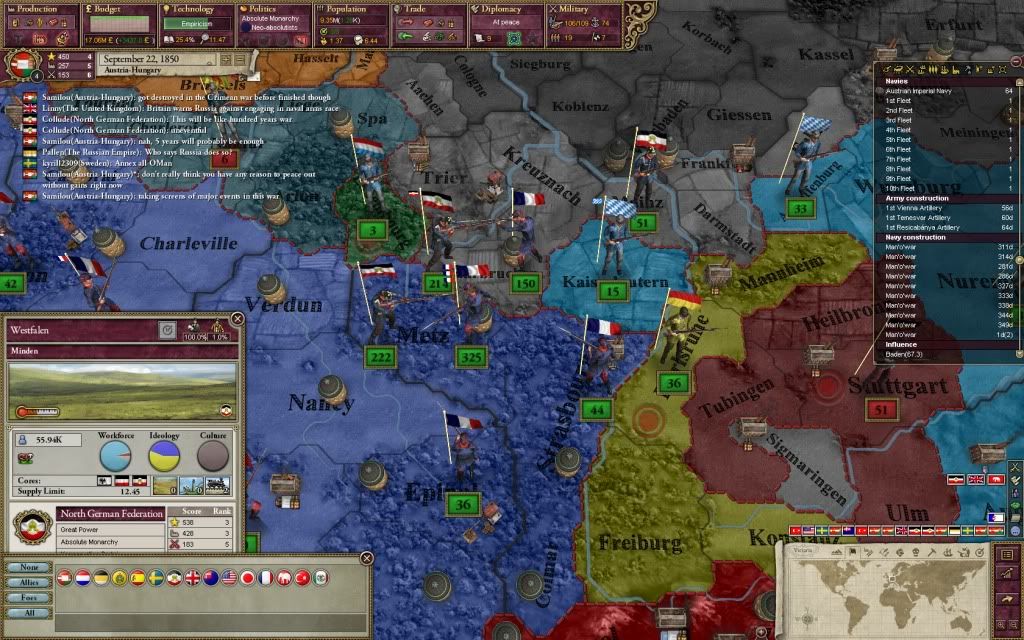
The decisive French move. Picture provided by the Austro-Hungarian secret service
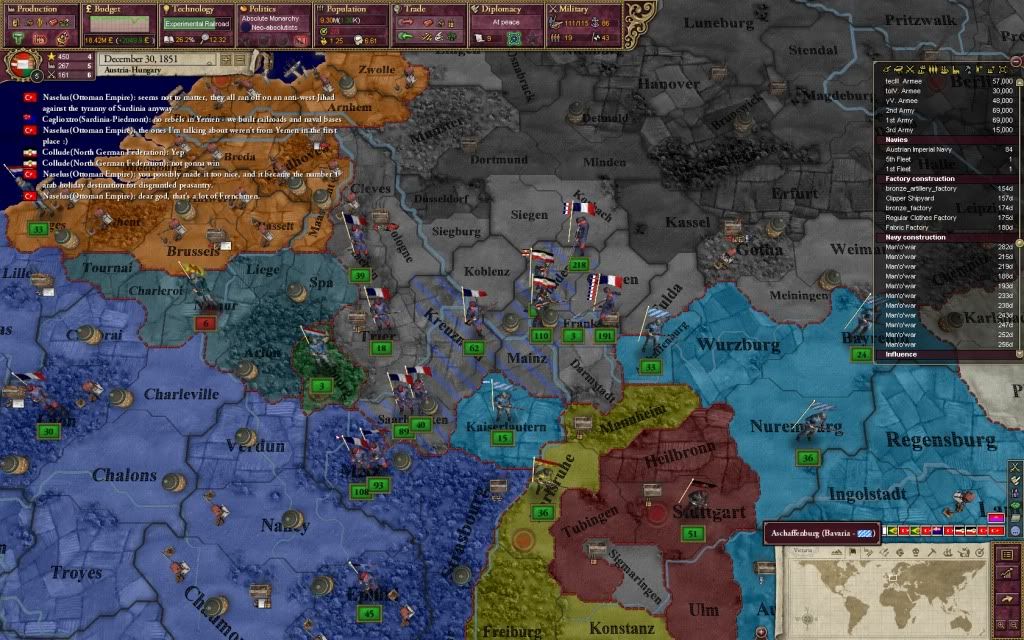
The Downfall of the German idea? Picture provided by the Austro-Hungarian secret service
The obvious question that arises from this somewhat surprising turn of events is: why was Germany defeated? There are of course many reasons for this but some are clearly are more insignificant than the others. One reason definitely was the fact that Germany was forced to be in the offensive in a war which clearly favoured the defence. There only is a very small land border between France and Germany and therefore both sides knew where the other would attack. Further the borders were heavily fortified meaning that any attempt at frontal attack would fail if not supported by a huge numerical superiority. This also meant that strategical mobility, one of the greatest advantages of the highly disciplined and organised German Army, was eliminated as a decisive factor for victory. If Germany would have had more freedom to, for example, surprisingly advance into France through Wallonia or the Netherlands, the entire war could have run differently. Equally the Germans failed to recognize how sophisticated French defences actually were and did not call of their attack early enough. In essence the Germans were forced to fight a war which in those circumstances was unwinnable.
However, one should not forget to add that the French army truly fought formidably in the conflict. While slightly in the advantage from the beginning, they did not rest on this fact but used their position to turn what could have been a white peace into a total victory for “La Patrie”. Also they made excellent use of their navy, cutting Germany of from world trade.
“If I like the Kaiser because I speak German? No, I prefer French democracy over a German tyrant any day”
- Inhabitant of Alsace Lorraine who served in the French Army
“This isn’t over. No…. This isn’t over!”
- Bavarian pan-nationalist
The Course of the War
“Sylvester 1850 was like any other New Year. There was the celebration, there was the alcohol of course and there were the fireworks. The fireworks were absolutely magnificent. All of Rio seemed to glow. Little did I know back then what sinister fireworks awaited me in Verdun…”
- Jose Arturio, war correspondent of the World History magazine
The Franco-German war was definitely the defining event of the 1850’s. The London Treaty quite frankly had failed to establish a lasting peace in Europe. The entire continent was split into two camps: the German camp which demanded German unification and the French camp which wanted to prevent this at all costs. In the late 1840’s it seemed like mankind was on the best way to a world war. In virtually the last moment the Ottoman Sultan, who arguably had most to lose from a total war, defused the situation by proposing to reduce all alliances within Europe to defensive pacts. Yet this did not solve the problem. The NGF still demanded Alsace-Lorraine while France continued to resist German unification. Fearing another rise in tensions an emergency meeting of the leaders of Europe was held. Noticing that no one except the main participants had anything to gain from a conflict, they decided that France and the NGF should simply “fight it out”.
“You have to imagine this situation. All of these rich blokes meet in some comfortable Chateux and there decide “to fight it out”. But it’s not them that fight, ey? It is not them who lie dead in Saarbrücken now, is it? You have to imagine this. They decide to go to war and who has to pay for it? We, the people, we have to pay for it. We have to know who our true enemies are. My enemy is the government, all governments; you will pay for what you have done…”
- Franz Meier, German Anarchist
The war officially started with the North German declaration of war in early 1850. However, in all but name, it had begun months earlier with a huge arms race. Both sides were preparing for conflict and both sides mobilized huge amounts of Forces in order to be ready for what was seen as struggle for existence by both nations. In order to gain public support for the conflict which inevitably would result in a huge loss of life, both sides stepped up huge Propaganda campaigns. While the French declared that citizen’s have to “defend the revolution” the Kaiser infuriated the Pan-German nationalists with stories about alleged French atrocities in Alsace-Lorraine. In essence, however, it can be concluded that France in had prepared better for the war. Not only did they have far more troops but they also fortified their borders with state of the art defensive structures.

The buildup to the war

The French preparations. Picture provided by the Austro-Hungarian secret service
The Germans did not predict this. They were convinced that their military was way superior to what they termed the “French militia” and chose a massive offensive as opening move. This proved to be a fatal mistake. The French had expected this and therefore could use their fortifications to their maximum advantage. Further the French were numerically superior to the advancing North German army. The result was obvious: wave after wave of German soldiers was slaughtered. Yet the General’s failed to realize this. They were convinced that the next advance would be the “push to victory”. Yet the French lines remained unbroken.

The German offensive as experienced by our war correspondent

The madness which ensued
“It was a hideous, a terrible sight. On one hand you just had to be impressed by these men. Group after Group, Column behind Column, Brigade by Brigade, they simply ran head on against the French walls. Such bravery indeed… On the other hand you also had to be horrified by what these men were ordered to do. After the third advance failed it was clear that there would be no victory. But the command for the next assault came just as the wounded returned. And they followed it. No questions asked; they just stormed into certain death. I wonder what compels men to do this. I could barely look up, so frightening and so terrifying was the artillery that turned every field into a wasteland. But they charged right in. 200,000 dead in just a few weeks. Such a waste of life for a now worthless land. For some nation this might be a victory. But the good in man has been decisively defeated. I only hope that such horror will never cross the Atlantic Ocean. Sometimes to be a coward is to be a hero…”
- Jose Arturio, war correspondent of the World History magazine
After several attempts to dislodge the French from their defensive positions the German army was exhausted. Their will to fight had been broken and their losses were irreplaceable. The French Generals saw their opportunity and ordered a swift advance into Saarbrücken. This proved to be the decisive blow for Germany. With their main army now encircled, any hopes of winning this war lost. The Germans still made a desperate attempt to turn the tide but it was too late. They were beaten and “the sons of Saint Louis” were already on their march towards Berlin. This forced the deeply humiliated German Kaiser to sue for peace. The peace Treaty is currently being drafted.

The decisive French move. Picture provided by the Austro-Hungarian secret service

The Downfall of the German idea? Picture provided by the Austro-Hungarian secret service
The obvious question that arises from this somewhat surprising turn of events is: why was Germany defeated? There are of course many reasons for this but some are clearly are more insignificant than the others. One reason definitely was the fact that Germany was forced to be in the offensive in a war which clearly favoured the defence. There only is a very small land border between France and Germany and therefore both sides knew where the other would attack. Further the borders were heavily fortified meaning that any attempt at frontal attack would fail if not supported by a huge numerical superiority. This also meant that strategical mobility, one of the greatest advantages of the highly disciplined and organised German Army, was eliminated as a decisive factor for victory. If Germany would have had more freedom to, for example, surprisingly advance into France through Wallonia or the Netherlands, the entire war could have run differently. Equally the Germans failed to recognize how sophisticated French defences actually were and did not call of their attack early enough. In essence the Germans were forced to fight a war which in those circumstances was unwinnable.
However, one should not forget to add that the French army truly fought formidably in the conflict. While slightly in the advantage from the beginning, they did not rest on this fact but used their position to turn what could have been a white peace into a total victory for “La Patrie”. Also they made excellent use of their navy, cutting Germany of from world trade.
“If I like the Kaiser because I speak German? No, I prefer French democracy over a German tyrant any day”
- Inhabitant of Alsace Lorraine who served in the French Army
“This isn’t over. No…. This isn’t over!”
- Bavarian pan-nationalist
Nice update.
Damn Frenchmen.
The British player should remember this quote instead of going all "splendid isolation" on Europe's ass.
Hate the Frenchman as you would the devil - Horatio Nelson
Damn Frenchmen.
The British player should remember this quote instead of going all "splendid isolation" on Europe's ass.
Hate the Frenchman as you would the devil - Horatio Nelson
Nice update.
Damn Frenchmen.
The British player should remember this quote instead of going all "splendid isolation" on Europe's ass.
Hate the Frenchman as you would the devil - Horatio Nelson
Didn't know you were such a Pro-German?
Well, the British are by no means isolationist. They have quite good relations with France at the moment. Also they are now most worried about a "naval race" with Russia. So its bound to stay interesting

